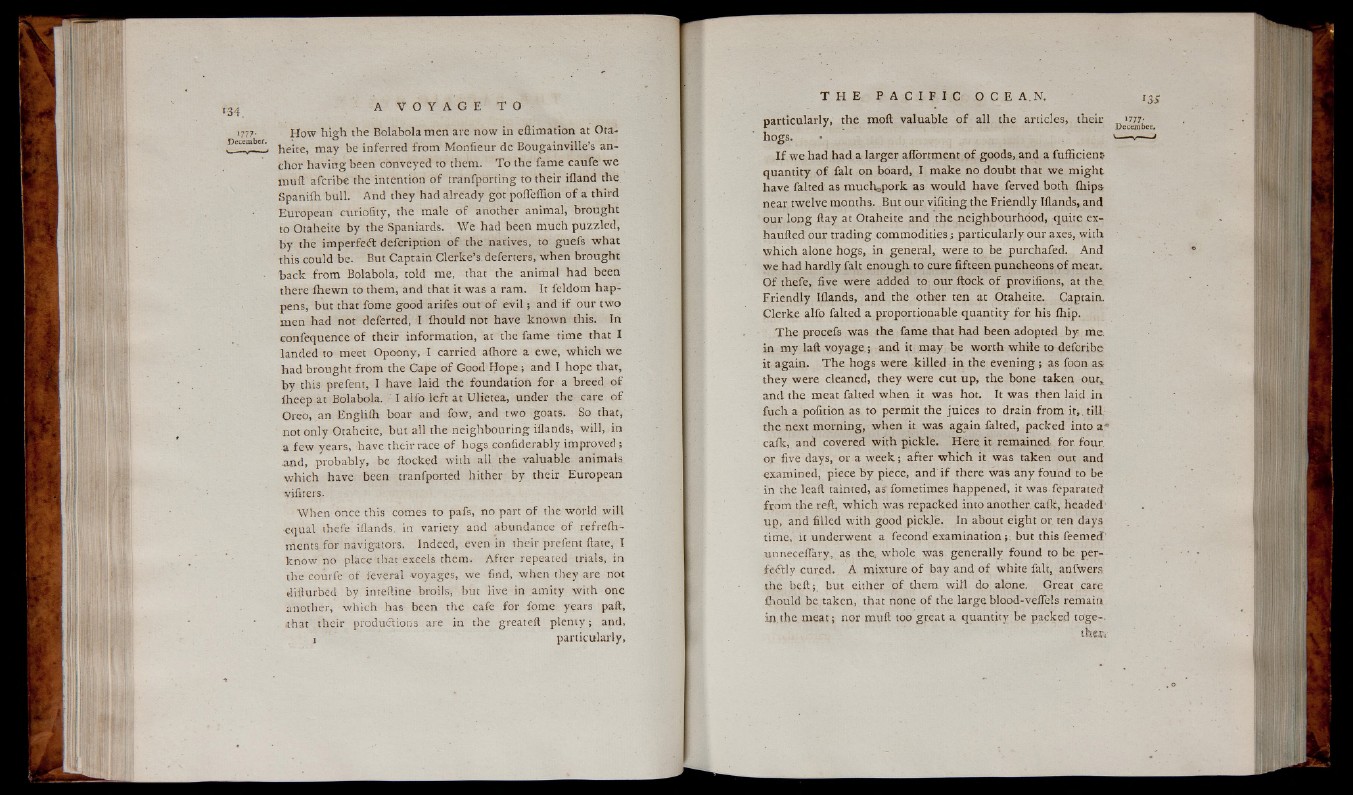
>777- How h igh the Bolabola m en are now in eftimation at Ota-
Detembef.^ may jje inferred from Monfieur de Bougainville’s anchor
ha vin g been conveyed to them. To the fame caufe w e
m u ll afcribe the intention o f tranfporting to their illand the
Spanilh bull. And they had already got pofleffion o f a third
European curiolity, the male o f another animal, brought
to Otaheite by the Spaniards. We had been much puzzled,
b y the imperfeCt defcription o f the natives, to guefs what
this could be. But Captain Clerke’s deferters, when brought
b a ck from Bolabola, told me, that the animal had been
there fhewn to them, and that it was a ram. It feldom hap pens,
but that fome good arifes out o f e v i l ; and i f our two
men had not deferted, I ihould not have kn own this. In
confequence o f their information, at the fame time that I
landed to meet Opoony, I carried a Chore a ewe, which we
had brou ght from the Cape o f Good Hope ; and I hope that,
b y this prefent, I have laid the foundation for a breed o f
fheep at Bolabola. I alfo le ft at Ulietea, under the care o f
Oreo, an Englifh boar and fow, and two goats. So that,
not only Otaheite, but all the n eighbouring illands, will, in
a few years, have their race o f hogs conliderably improved ;
.and, probably, be Hocked with all the valuable animals
which have been tranfported hither by their European
vifiters.
When once this comes to pafs, no part o f the world will
■equal thefe illands, in variety and abundance o f refrefh-
ments fo r navigators. Indeed, even in their prefent Hate, I
kn ow no place that excels them. After repeated trials, in
the courfe o f feveral voyages, we find, when they are not
difturbed by inteftine broils, but live in amity with one
another, w hich has been the cafe for fome years pall,
tha t their productions are in the greateft p le n ty ; and,
i particularly,
oarticularly, the moft valuable o f all the articles, their >777-
* J . D e c em b e r .
I f w e had had a larger aflortment o f goods, and a fufticient*
quantity o f fait on board, I make no doubt that we m igh t
have falted as mucha,pork as would have ferved both ihips
near twelve m onths. But our vifiting the Friendly Illands, and
our long Hay at Otaheite and the neighbourhood, quite ex-
haufted our trading commodities; particularly our axes, with
w hich alone hogs, in general, were to be purchafed. And
we had hardly fait enough to cure fifteen puncheons o f meat..
O f thefe, five were added to our flock o f provifions, at the
Friendly Iilands, and the other ten at Otaheite. Captain.
Clerke alfo falted a proportionable quantity for his fhip.
T h e procefs was the fame that had been adopted b y me.
in m y laft voyage.; and it may be worth while to defcribe
it again. T h e hogs were killed in the e v e n in g ; as foon as
they were cleaned, they were cut up, the bone taken our,
and the meat falted when it was hot. It was then laid in.
fuch a pofition as to permit the juices to drain from it;, t i l l
the next morning, when it was again falted, packed into a*
calk, and covered with pickle. Here it remained for. fo u r
or five'days, or a w e e k ; after w h ich it was taken ou t and
examined, piece b y piece, and i f there was any found to be
in the leaft tainted, as fometimes happened, it was feparated
fr.om the reft, w h ich was repacked into another, calk, headed’
up, and filled with good pickle. In about e ight or ten days
time, it underwent a fecond examination;. but this feemed'
unnecefliiry, as the. whole was generally found to be per-
fedlly cured. A. mixture o f bay and o f white fait, anfwers
the be ll;, but either o f them w ill do alone. Great care
fhould be taken, that none o f the la rge blood-veftels remain.
in.the meat; nor muft too great a quantity be packed toge-.
ther.